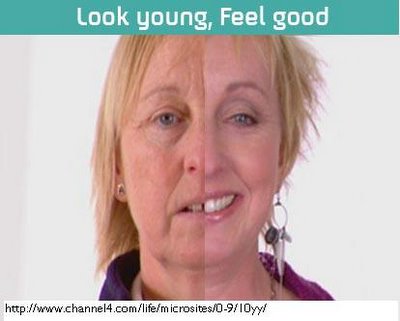
Last night I was watching Ten Years Younger, one of the most terrifying programmes on TV at the moment. For those who haven’t seen it, Ten Years Younger takes ‘old and tired’ women, mainly, and transforms them through cosmetic surgery and dentistry, make-up, hair styles and new clothes. It’s probably the most extreme makeover show made in the UK (I have seen US made Extreme Makeover – and that’s pretty fucking horrifying too). However I’m not going to go on about cosmetic surgery and perception of old age etc, I’m actually interested in the male narrator of the show.
Ten Years Younger is presented by a woman (who is early 30s max), and it is narrated by a man. The show does occasionally ‘make over’ men (I think, though I’ve never seen one myself) but the overwhelming majority of its makeover candidates are women.
The choice to use a male narrator is interesting in this context. Is he the ‘voice of the patriarchy’ passing male judgement over these women who may be going through this makeover for culturally, and thus patriarchally, defined reasons?
I am not opposed to male narration of such shows per se, just interested in why such a choice was made. I don’t think that they should change narrator or presenter to suit the gender of the makeover subject, but due to the larger number of women subjects on this particular show the choice of narrator initially is cause for thought.
A technique employed in this show is for the narrator to be the bridge to the viewer, and as such often the voice of the viewer, reflecting what the shows creators think the audience may be thinking about the show at any given moment.
For example he may make comments such as:
“As women know, makeup can be our best friend”
This is a strange sentence construction to come from a man – firstly he’s not a woman and the pronouns don’t match as they would if a woman read this sentence, and he also refers to makeup as ‘our’ best friend, thus including himself. He also refers to ‘us’ throughout the show when talking about a female makeover candidate and the procedures she goes through such as cosmetic surgery, makeovers, haircuts. Viewers know that men generally do not wear makeup – so by including himself in this statement via the word ‘our’ this narrator is familiarising himself with women and their bodies, whilst being obviously removed from their experieinces.
This kind of construction continues through out the show, the male narrator reading lines that sound as if they were written to be read by a woman.
I am interested now to see how many other makeover shows, with a focus more heavily on women, are narrated by men. Is this a constant? Does the male narrator function as the judging ‘male’ the woman is trying to appease?
It would be interesting to see what the audience viewing figures for the show are by gender. I would guess that mostly women watch it, but maybe I am wrong. Maybe men watch it predominantly, thus the male narrator, or maybe they hope more men will watch it, and the male narrator has been chosen in a attempt to make it more relevant to them.


 This may indicate a wider dominant schema children have for scientist as MALE. This may be due to lower levels of women having science based careers, or to less successful women scientists being publically proclaimed. It may also indicate that girls meeting female scientists then identify women as scientists predominantly. Also this doesn't include social sciences (domainated by women in my experieince) - perhaps they're not considered to be real sciences?
This may indicate a wider dominant schema children have for scientist as MALE. This may be due to lower levels of women having science based careers, or to less successful women scientists being publically proclaimed. It may also indicate that girls meeting female scientists then identify women as scientists predominantly. Also this doesn't include social sciences (domainated by women in my experieince) - perhaps they're not considered to be real sciences?


